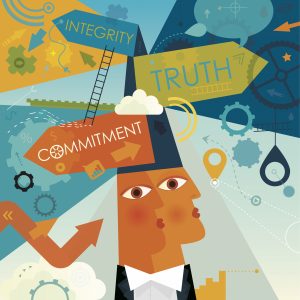INFO 256: ARCHIVES AND MANUSCRIPTS
The Dilemma
Let’s imagine for a second, that we are an archivist at a public university and have just acquired a historically valuable yet unknown collection. This collection could have a major impact on the history field, and you would like to use the collection to write a book. While it would be amazing to be the first to examine and reveal this new information, we know that other researchers would like to do the same. What should we do? What steps do we take? What kind of issues would this create? Before taking in this new collection, I would want to make sure it would add value to our institution, and I would want to make sure that the collection falls under the mission of our institution. Before sharing this collection, I would want to verify its authenticity. I would ask who the creator is and what their relationship to the material is. I would want to make sure that the collection is credible, meaning we would need to do some fact-checking. Since this collection deals with history, I would want to examine the effects it may have in the real world. What type of historical figures or events does this collection include? What would be the impact? Who will want to have access to this collection? What type of research would this collection be used for? Can this collection be studied under fair use? Once we have confirmed our sources and answered our questions, we can examine the impact of either keeping this new historical collection to ourselves or not.

In this situation, there are two scenarios. One scenario in which we keep this collection to ourselves in order to write a book and one scenario, in which we do not and lose out on being the first to act on the collection’s history-altering information. In keeping this historical collection to ourselves and writing about it, we would not be following the SAA Core Values Statement and Code of Ethics for Archivists in their entirety. In both scenarios, our job as archivists would follow the first three directives of the SAA Core Values of “identifying and preserving essential records that document the cultural heritage of society;” “organizing and maintaining the documentary record of institutions, groups, communities, and individuals;” and “assisting in the process of interpreting documentation of past events through the use of primary source materials” (2020). However, by keeping the collection private we would not be “serving a broad range of people who seek to locate and use the information found in evidentiary records” (2020). Even by waiting to make the collection public, we go against archival core values. We are working at a public university and should make all records and collections accessible as soon as they are acquired. It wouldn’t be right to keep something to ourselves. Use and access are big parts of an archivist’s role, as they are the facilitator between collections and researchers. Having access to records is essential and SAA notes that “while access may be justifiably limited in some instances, archivists still seek to foster open access and unrestricted use as broadly as possible when appropriate” (2020). This collection is of a historical nature and should be shared in order to keep the historical integrity and accountability of leaders and historical figures. As archivists, we have a social responsibility to make new and valuable information accessible right away.
Hiding a collection for our own benefit brings about ethical issues and would not be following the Code of Ethics for Archivists. Under the Code of Ethics, archivists should always uphold a professional relationship and use proper judgment. It would not be proper nor professional to stray from the usual way that collections are acquired and not follow institutional policies. The Code of Ethics also notes that archivists must keep record authenticity and security during archival and establish trust through access. Archivists must always do their due diligence to make sure collections are genuine and authentic. They do this by checking sources and the relationship of the collection to its creator. Keeping a collection authentic and safe helps to foster trust between institutions and their patrons. They need to know that they can rely upon archivists to give them the most accurate and timely information for their research purposes.
If an archivist contemplates holding onto information for their own benefit that is a huge problem and means that there is a conflict of interest regarding this newly acquired collection. The SAA notes that “archivists should demonstrate professional integrity and avoid potential conflicts of interest,” keeping in mind that they, “seek to balance the rights, interests, needs, and suggestions of all people and groups affected by archival decisions” (2020). To better follow SAA guidelines, it may be beneficial for another archivist to handle processing the collection. Establishing these ground rules will develop trust between archivists, institutions, and researchers. The consequences of withholding a collection could break down the relationships between coworkers as well. There may also be some legal issues around developing a book from the collection. The collection is at a public institution and may be used for research purposes however it could get a bit sticky if the collection was withheld by a member of the institution’s staff. Using a collection secretly for personal gain is not only sneaky but ethically wrong.
In the second scenario where we don’t keep the collection to ourselves, SAA core values would be upheld in their entirety. We would be providing access to the collection and use to those that request it. This way any new historical information that may be gleaned from the collection can be shared and hopefully add to history. As archivists, we want the most accurate telling of the past and if new information comes to light, it is our duty to expose it. We would also be avoiding any conflicts of interest or ethical issues by processing the collection and being straightforward about its contents. If I came across this dilemma, I would choose to process the collection and share its findings straightaway. Then I would avoid any issues. While the collection holds great historical value, there is a chance that I would still be one of the first people to use the collection for research. There may still be some issues around fair use and what I would be able to do with my research on the collection. I would really need to have answers to what is exactly in the collection. Overall, it would benefit me as the archivist to uphold my own integrity as well as the integrity of the public university.
Reference:
Lawrimore, E. (2022.) Unit 4-A: Archival Use and Users. https://sjsu.instructure.com/courses/1483142/pages/unit-4-a-archival-use-and-users?module_item_id=13170487
Society of American Archivists. 2020. SAA Core Values Statement and Code of Ethics. https://www2.archivists.org/statements/saa-core-values-statement-and-code-of-ethics#code_of_ethics


No comments:
Post a Comment